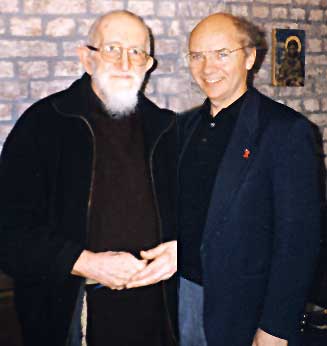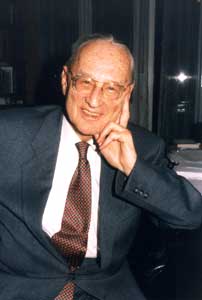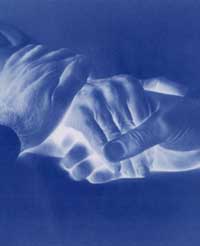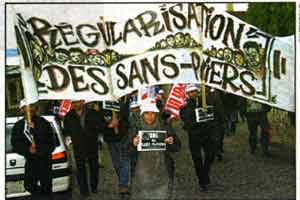Interview of Abbé Pierre
 |
The Canadian television was insisting on having both of us for a common broadcast transmission. I was sitting by the side of Abbé Pierre; he is still in charge of many struggles and actions. During the interview I was surprised when Abbé Pierre presented his recent personal experience: he was in Madagascar, in the lower parts of Tananarive, after a tornado had devastated the country.
The Abbé saw misery unbearable for him. He had never seen
such misery before! Then he said: "I could not understand
the silence of God in front of such an unjust fate imposed on
people. I almost blasphemed. Since then, I have to say that I
cannot believe like before."
- Tow persons lost.
- All at once I lost two Swiss friends, two beloved priests. One was a well-known theologian, outspoken and sometimes feared. The other was a man of practical experience, always defending the refugees.

Professor Herbert Haag had been a Professor at the famous university of Tübingen. He had his free speech, a rare case in our days. He had the courage to speak about matters that the Church does not like. About ten years ago, I received from him in Lucerne a reward for my action in Evreux. - Cornelius Koch devoted his life to the service of refugees and the excluded persons from the society. On his hospital bed he was still fighting for a collective legalization of illegal immigrants in Switzerland. It was quite a thing to be with him to defend the illegal immigrants from Almeria in Andalusia or from Freeburg in Switzerland.
These two priests are the honor of the Church.
Living together
We were twenty-two going to Palestine. Most of the members of the group were cameramen, journalists, and photographers.
 |
We lived together for six days in a Palestinian camp close to Bethlehem. I was in a dormitory of six with superposed beds. |
The collective actions, the transportation, the meetings have made us all the time close to each other.
Three of them were Moslems. Another one told me he was born in a catholic family and was baptized but he left the Church to be himself. For him the Church represents the moral order. What counts for him is truth. He kept his distance from the Church to be free. Regarding the other members of the group they had no reference to any religion but they were not indifferent to the presence of a bishop among them. It was important for me to be humanly present and ready to help. I cannot testify for the Gospel before the other considers me as a brother for him. If I feel that I am superior than him, there will be no real understanding between us.
| Thanks to the Palestinians, we have been able to live together in an astonishing way, with an unforgettable human relationship for every one of us. |

|
- Where is God?

In front of the Town Hall of Paris a demonstration of illegal African immigrants was moving through a series of fences. - Between them and the Town Hall there was a thick row of policemen as usual. Banners were floating in the wind. The loud speaker was pouring slogans tirelessly repeated by all the demonstrators. The tam-tams were animating the place. I was among these Africans, suddenly a man came up to me and said: "What about God?"
I answered quickly: "God is here" "Are you sure?" "Yes, God is always on the side of the oppressed people" " he is not on the side of the policemen?"" Because God is with the oppressed people, he excludes nobody" 
The man that I did not know still asked a last question " You are blamed for not speaking about God in the media". "For many people, God is not a synonym of liberation". The man shook my hands and said," I agree with you".